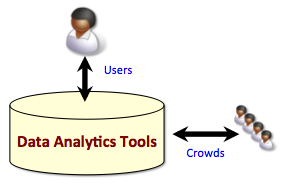CS598: Human-in-the-loop Data Management

The course explores two complementary roles for humans as applied to interactive data analytics: one, where humans are the analysts performing or supervising the analysis; here, the emphasis is on building usable tools for these analysts, and second, where humans are the crowdsourced workers assisting with the computation and analysis; here, the emphasis is on having humans process as little data as possible while gaining maximum benefit.
Students will read a number of papers: both important landmark papers as well as cutting-edge papers, act as a discussant for a paper at least once, and complete a semester-long implementation project. Familiarity with basic databases, machine learning, and algorithms expected.
News
- August 25: The final list of papers and schedule is up. Following the instructions given below, by midnight September 1: you need to send us the list of 5 papers that you'd like to present.
- August 25: There will be no classes on 8/31 and 9/02 as Aditya will be attending the VLDB conference
Course Significance
Crowd-Powered Analytics: An IBM study estimated that 80% of the data recorded every day is unstructured: i.e., it consists of images, videos and text. Fully automated processing of unstructured data is not yet a solved problem. Humans, on the other hand, are very good at understanding, interpreting, and processing unstructured data. How do we use humans to effectively process large volumes of unstructured data?
Interactive Analytics: A McKinsey Big Data Study estimated that 10s of Millions of new data analysts will be needed by 2015. With so many novice data analysts interacting with data, how do we enable them to quickly get valuable insights? Quickly could mean generating the same results faster, but approximately; it could mean showing them visualizations instead of raw data; it could mean helping the users to ``guess'' the query or insight in mind.
Grading Policy
- Class Reviews: 20%
- Due day before class at midnight. Starts on 8th Sep
- Lightly graded; allowed to miss 3 (three) in total. Late submissions count towards the 3
- After 3 misses, you lose 1% of grade per missed review
- Class Participation: 15%
- Paper Presentation: 15%
- Send us top 5 papers you’d like to present on 1st Sep
- The presentation slides should be mailed to Tarique 48 hrs in advance of your presentation
- Research Project: 50%
- Proposal (23rd Sep) + report + presentation
Instructions for Submitting Class Reviews
You must use the following link to submit class reviews: Link.
Remember to cover the 5 key questions: what is the problem, why is it important, what sets it apart from previous work, what are the key technical ideas, what are the key flaws and open issues, all within 500 words.
The class reviews must be submitted by midnight the day before class.
Instructions for Submitting List of Papers to Present
You must use the following link to submit your list of top-5 papers: Link.
The papers you provide can be from the list given below. You are also free to list a paper of your choice, but it must match the themes of the class. This list must be submitted by midnight September 1. .
Schedule
Tentative List of Papers
Theme 1: Dealing with Unstructured and Noisy Data
Crowd-Powered Systems
- CrowdDB: Answering Queries Using Crowdsourcing
- Turkit: Human Computation Algorithms on Mechanical Turk
- Deco: Declarative Crowdsourcing
Crowd-Powered Algorithms
- CrowdScreen: Algorithms for Filtering Data Using Humans
- Human-Powered Sorts and Joins
- Crowdsourced Enumeration Queries
- So Who Won: Dynamic Max Discovery with the Crowd
Data Cleaning Systems
- Wrangler: interactive visual specification of data transformation scripts
- Profiler: Integrated Statistical Analysis and Visualization for Data Quality Assessment
- Arnold: Declarative Crowd-Machine Data Integration
- FlashExtract: A Framework for Data Extraction by Examples
- Potter’s Wheel: An Interactive Data Cleaning System
Theme 2: Dealing with Huge Data
Scalable Data Processing Systems
- Spark SQL: Relational Data Processing in Spark
- Dremel: Interactive Analysis Of Web-Scale Datasets
- Shark: SQL And Rich Analytics At Scale
- Resilient Distributed Datasets: A Fault-Tolerant Abstraction for In-Memory Cluster Computing
- Better bitmap performance with Roaring bitmaps
Approximate Analytics
- BlinkDB: Queries with Bounded Errors and Bounded Response Times on Very Large Data.
- The Aqua Approximate Query Answering System
- Scalable Progressive Analytics on Big Data in the Cloud
Scalable Visualizations
- imMens: Real-time Visual Querying of Big Data
- Trust Me, I’m Partially Right: Incremental Visualization Lets Analysts Explore Large Datasets Faster
- Online Aggregation
- Incremental, Approximate Database Queries and Uncertainty for Exploratory Visualization
Theme 3: Dealing with Novice Analysts
Visual Analytics Systems
- Polaris: A System for Query, Analysis, and Visualization of Multidimensional Relational Databases
- SeeDB: Automatically Recommending Query Visualizations
- VisComplete: Automating Suggestions for Visualization Pipelines
- Voyager: Exploratory Analysis via Faceted Browsing of Visualization Recommendations
New Interfaces and Usability
Autocompletion and Query Refinement
- Snipsuggest: Context-aware autocompletion for sql
- Query By Output
- DataPlay: Interactive Tweaking and Example-driven Correction of Graphical Database Queries
- Machine learning for online query relaxation
Theme 4: Dealing with New Data Analytics Scenarios
Machine Learning and Graph Processing
- MAD Skills: New Analysis Practices for Big Data
- MLbase: A Distributed Machine-learning System
- GraphLab: A New Framework For Parallel Machine Learning
Collaborative Query Processing
Machine Learning and Graph Processing
- MAD Skills: New Analysis Practices for Big Data
- MLbase: A Distributed Machine-learning System
- GraphLab: A New Framework For Parallel Machine Learning
Collaborative Query Processing
Implementation Project
As part of this course, you need to complete a semester-long project. See the instructor for ideas. Alternatively, you are free to look for ideas in your domain of expertise: for instance, if you work in computational journalism, building a new way to browse and manage large collections of textual archives could be a perfectly reasonable project. Either way, you must speak to the instructor to verify that the project is indeed "challenging" enough.